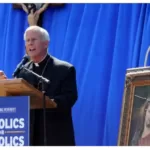In a display of widespread discontent, tens of thousands of Spaniards gathered across the nation to voice their opposition to the government’s controversial plan to offer amnesty to those involved in the illegal push for Catalan independence in 2017. The proposed amnesty law, intended to secure political support for the acting government, led to violent protests outside the Spanish Socialist Workers’ Party (PSOE) headquarters in Madrid.
Political Maneuvering Spurs Public Outcry
The move to grant clemency to individuals involved in the unilateral attempt to secede from Spain has intensified political tensions. While PSOE leader Pedro Sánchez argues that the amnesty would foster coexistence post-2017’s political crisis, critics perceive it as a calculated strategy for the PSOE to maintain power. Sánchez’s opponents assert that the proposal is a self-serving maneuver to secure another term in office.
Amnesty Offer in Exchange for Political Backing
The amnesty debate emerged after the inconclusive general election in July. Despite the People’s Party (PP) finishing first, the inability to form a government led to political gridlock. In contrast, the PSOE, along with the left-wing Sumar alliance, managed to gain support by promising amnesty to the two main Catalan pro-independence parties. Sánchez is now poised to secure reappointment as prime minister, sparking public outrage and prompting widespread demonstrations.
Nationwide Protests and Opposition Voices
Protests unfolded on Sunday in major cities, including Madrid, Barcelona, Seville, and Valencia. Demonstrators in Madrid’s Puerta del Sol square expressed their discontent, holding effigies of Sánchez, chanting slogans, and carrying banners emphasizing concerns over democracy and amnesty for terrorism. The conservative PP claimed 500,000 participants in the Madrid rally, while the government’s delegate estimated 80,000.
Political Leaders Address the Crowds
PP’s leader, Alberto Núñez Feijoo, accused Sánchez of trading judicial impunity for political support, asserting that the prime minister’s office shouldn’t be “bought and sold.” Isabel Díaz Ayuso, the populist PP president of the Madrid region, labeled Sánchez’s project as “totalitarian,” alleging a disregard for democratic norms. Vox’s leader, Santiago Abascal, termed the amnesty deal a “coup d’état in capital letters” and called for sustained mobilization beyond the Sunday demonstrations.
Sánchez Urges Opposition to Exercise “Good Sense”
Responding to the mounting opposition, Sánchez appealed to the PP to exhibit “good sense” and respect the election results. He urged them to reject the influence of the far-right and abandon a “reactionary path.” Sánchez emphasized his commitment to governing for all Spaniards, focusing on social progress and coexistence over the next four years







